Our films will screen Wednesday nights at 7:30 pm (unless otherwise noted) at the Portage Theater on 4050 N. Milwaukee Ave. – Admission is $5
Programmed and Projected by Julian Antos, Becca Hall, and Kyle Westphal.
Some of this season’s screenings are sponsored by portoluz, an organization formed to provide sustainable environments for innovative artistic exploration and a wide range of progressive discourse. In 2012, their theme is WPA 2.0: A Brand New Deal [PDF]. They are interested in reexamining the conditions that gave rise to the New Deal reforms and exploring parallels that might be relevant today.
The schedule is also available through Google Calendar.
——
Wednesday, April 25th @ 7:30pm
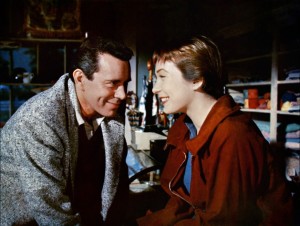 THE TROUBLE WITH HARRY
THE TROUBLE WITH HARRY
Directed by Alfred Hitchcock • 1955
Shirley MacLaine’s husband Harry is dead, and everyone in town (a retired sea captain, an old maid, and aspiring roadside landscape painter John Forsythe) thinks they did it. Determined to bury their guilty consciences, the bewildered New Englanders each try to dispose of Harry’s corpse before the authorities get involved. The unusually simplistic “Fractured Fairytales” style plot earned the film a gentle pan from critics, but there’s really nothing else like The Trouble With Harry in Hitchcock’s filmography. The result is a film with a morbid tongue in a morbid cheek, all of Hitchcock’s trademark style, and an unexpected kindness and sincerity. Vistavision and Technicolor rarely look as good as they do here with Robert Burks’s location photography and a palette of earthy reds and golds, and MacLaine is uncompromised in her first starring role. The Chicago Sunday Magazine wrote, “The versatility of this auburn topped lass, who looks as though her hair was coiffed with an egg beater, has legs like Dietrich, and can turn on a charm current which leaves males limping has prompted her bosses into bold experiments.” Er, we have trouble imagining a world without her. (JA)
99 min • Paramount Pictures • 35mm from Universal
Short: TBA – 20 min
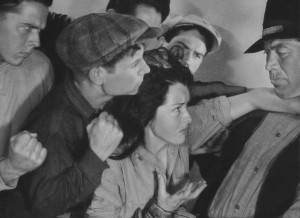 Wednesday, May 2nd @ 7:30 pm
Wednesday, May 2nd @ 7:30 pm
WILD BOYS OF THE ROAD
Directed by William A. Wellman • 1933
William Wellman’s sleek, gritty melodrama about teenagers faced with the reality that their parents don’t have enough money to feed them stars Frankie Darro and Edwin Phillips as two high school sophomores who leave home in search of work. Train hopping their way through the Midwest, they meet several other orphaned teenagers – among them Dorothy Coonan, who was doing fine until her aunt’s brothel was shut down – and ride from town to town and slum to slum as they are run out by (terrifying) local authorities. Few people worked as efficiently in pre-Code Hollywood as “Wild Bill” Wellman, balancing a strong (yet realistic) social conscience with as much sex, violence, and humility as could fit into a five- or six-reel feature. His work for First National and Warner Brothers in the early ‘30s represents much of what made movies as important as they were during the depression. (JA)
Co-presented with portoluz–WPA 2.0: A Brand New Deal
68 min • Warner Bros. Pictures • 35mm from the Library of Congress, permission Warner Brothers
Short: Our Gang in “Free Wheeling” (Robert McGowan, 1932) – 16mm – 20 min
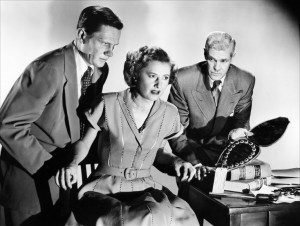 Wednesday, May 9th @ 7:30pm
Wednesday, May 9th @ 7:30pm
THE FILE ON THELMA JORDON
Directed by Robert Siodmak • 1950
Barbara Stanwyck shows up late one night in the DA’s office to report an attempted burglary and is greeted by the DA’s assistant Wendell Corey, who is completely plastered and offers to fix a parking ticket for her if she’ll join him for a drink. Corey’s wife and children are away on their summer vacation and he starts seeing Stanwyck regularly. Things spiral out of control when Corey ends up being the prosecuting attorney in a murder case against Stanwyck, and the two lovers are met with crippling fate. A murky, slow burning star picture, Wendell Corey is an unlikely but excellent match for Stanwyck (he’d do it again the same year in Anthony Mann’s The Furies, also Paramount and a similarly devastating production) in a film that feels like a much more sinister version of Double Indemnity. Time Out noted “[Corey’s] haunted, hangdog persona as a perennial loser is echoed so perfectly well by the deliberately inexorable tempo of Siodmak’s direction … the film emerges with a quality akin to Lang’s dark, romantic despair.” (JA)
100 min • Paramount Pictures • 35mm from Paramount
Cartoon: Tom & Jerry in “The Duck Doctor” (Hanna-Barbera, 1952) – 35mm Technicolor – 7 min
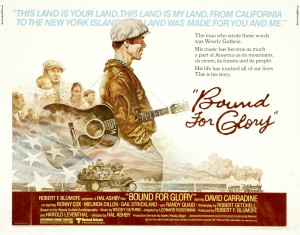 Wednesday, May 16th @ 7:30 pm
Wednesday, May 16th @ 7:30 pm
BOUND FOR GLORY
Directed by Hal Ashby • 1976
A long-gestating adaptation of a decades-old autobiography, Bound for Glory finally brought the life of Woody Guthrie to the screen in the unlikely form of David Carradine, then best known for TV’s Kung Fu. The film focuses on a scant few years in Guthrie’s life, 1936-1940, when the crusading troubadour came to embody a uniquely righteous presence on the American scene. Hopping trains and visiting labor camps, always organizing for some cause or another, often at the expense of his family, Guthrie comes across here as a refreshingly complex, unsanitized figure. More respected than loved upon its release (though Variety unexpectedly celebrated this lefty biopic as an overdue Bicentennial sop from a Hollywood unaccountably allergic to patriot pageants), Bound for Glory now looks both old-fashioned and totally new: the meandering narrative rhythms (an Ashby specialty) and the gorgeous, stately cinematography courtesy of Haskell Wexler mix with the first-ever use of the Steadicam and its roving naturalism in a Hollywood feature. (KW)
Co-presented with portoluz–WPA 2.0: A Brand New Deal
147 min • United Artists • 35mm from Park Circus
Short: “To Hear Your Banjo Play” (Irving Lerner & Willard Van Dyke, 1947) – 16mm – 16 min
Wednesday, May 23nd @ 7:30pm
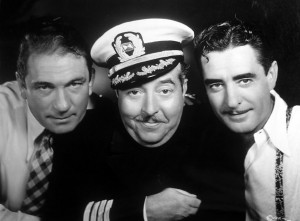 CAPTAIN HATES THE SEA
CAPTAIN HATES THE SEA
Directed by Lewis Milestone • 1934
Bookended by newspaperman and would-be novelist John Gilbert leaving his girlfriend to get on the San Capador to escape Hollywood and falling back into her arms in New York, the ocean voyage in between coasts is what dreams are made of. The film stars a bond thief (Fred Keating), a detective (Victor McLaglen) who falls for the Keating’s girlfriend (Helen Vinson), the ship’s steward (Leon Errol), an ex-prostitute (Wynne Gibson), an ex-prostitute’s husband (John Wray), The Three Stooges, and the titular Captain (Walter Connolly), a host of others, and somehow it all works. High production costs and – despite an insanely good cast – a lack of big name stars led to a limp-wristed Heaven’s Gate style release from Columbia, and the picture was all but forgotten. But per Otis Ferguson, who championed the film for his entire career, The Captain Hates the Sea was “the best neglected picture in two years … not only a departure from the safe cycles but a picture without a plot, an informal, nonhomey, so-what sort of a picture. Sadder.” The film has been crying for reevaluation ever since. (JA)
93 min • Columbia Pictures • 35mm from Sony Pictures Repertory
Short: Betty Boop in “S.O.S.” (Dave Fleischer, 1932) – 16mm – 7 min
Wednesday, May 30th @ 7:30 pm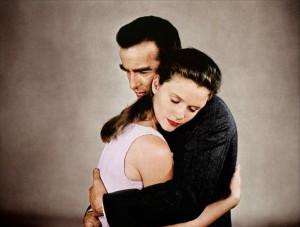
WILD RIVER
Directed by Elia Kazan • 1960
Montgomery Clift is an agent for the Tennessee Valley Authority (created by FDR’s New Deal to stop the flooding of the Tennessee River and bring electricity to impoverished areas in 1933) in charge of overseeing the construction of a dam. Faced with local opposition for (among other things) employing black workers, Clift’s biggest struggle is convincing Lee Remick’s grandmother (the great Jo Van Fleet) to move off of her island in the middle of the river. Shot on location in Charleston and Cleveland, Tennessee, Wild River was for the last couple decades available only in faded, muddy prints. This recent restoration by Twentieth Century Fox and Criterion Pictures returns Elia Kazan’s masterpiece (and an atypically humanist effort from the director of such dire engagements as A Streetcar Named Desire and On the Waterfront) to its full glory, and what surfaces is a picture that understands the great sadness that comes when even the most dysfunctional of cultures is washed away well-intentioned progress. (JA)
Co-presented with portoluz–WPA 2.0: A Brand New Deal
110 min • Twentieth Century Fox • 35mm from Criterion Pictures USA
Short: “People of the Cumberland” (Elia Kazan, et al., 1937) – 16mm – 18 min
Wednesday, June 6th @ 7:30pm
THE HALLIDAY BRAND
Directed by Joseph H. Lewis • 1957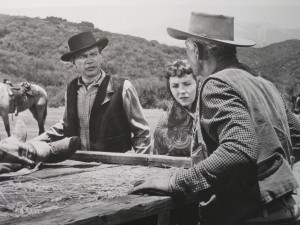
The Halliday Brand means something in this town: rock-ribbed posse justice and vigilance against domestic subversion. But Sheriff Ward Bond’s tin star begins to rust when his racist indifference to the lynching of his daughter’s half-breed fiancé turns his own family against him. Soon his son Joseph Cotten becomes a barn-storming terrorist with a tomahawk brand intent on crippling and dismantling the prairie patriarchy. Produced by Collier Young and generally recalling the calm rectitude of the films he made with ex-wife Ida Lupino, The Halliday Brand is the finest (and most neglected) liberal western to emerge from the ’50s. Pitting noted reactionary Ward Bond (in a rare and accomplished leading role) against the blacklisted Betsy Blair, the whole movie plays like a political exorcism in a rented hacienda. Low-budget maven Joseph H. Lewis applies his considerable economy to the project, making each beatific landscape count in this stingy-but-passionate production. (KW)
79 min • United Artists • 35mm from Park Circus
Cartoon: Daffy Duck in “Drip-Along Daffy” (Chuck Jones, 1951) – 16mm – 7 min
Wednesday, June 13th – THEATER DARK
Wednesday, June 20th @ 7:30 pm
YOU AND ME
Directed by Fritz Lang • 1938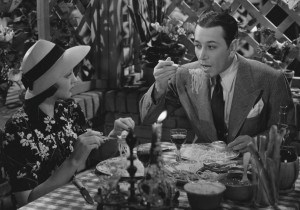
Liberal department store magnate Harry Carey puts his payroll where his politics are and hires ex-convicts to run his shop as a reform gesture. Two such specimens, Sylvia Sidney and George Raft, fall in love—a mistake that dredges up uncomfortable personal histories and threatens Sidney’s chances with the parole board. The siren song of crime calls to Raft anew. As if Fritz Lang’s efforts were not already the most Germanic product to come out of Hollywood, You and Me, his third American feature, enlisted composer Kurt Weill to pen charming-dialectic tunes like “The Song of the Cash Register.” If not quite a stateside Threepenny Opera (a Damon Runyon-inflected romantic comedy with gangsters and songs would be closer to the mark), there’s an undeniably daffy and intellectual film in here. (It even ends with Sidney’s mathematical demonstration of the familiar adage that Crime Does Not Pay.) Coldly received when it was new, the befuddled reviews portend an obviously great movie. Per Variety, “There’s quite a bit of the René Clair in You and Me. Lang tries to blend dramatic music with melodramatic action more than heretofore. It’s a sort of cinematic Mercury Theatre, by way of Marc Blitzstein-Orson Welles, with European flavoring, also.” (KW)
Co-presented with portoluz–WPA 2.0: A Brand New Deal
90 min. • Paramount Pictures • 35mm from Universal
Cartoon: Mighty Mouse in “He Dood It” (Eddie Donnelly, 1943) – 35mm Technicolor – 7 min
Wednesday, June 27th @ 7:30 pm
AFTER TOMORROW
Directed by Frank Borzage • 1932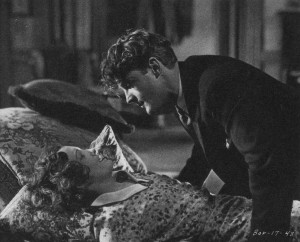
On twenty dollars a week, Charles Farrell can barely get by, let alone scrape together a down payment on a future with his dumbbell sweetheart, Marian Nixon. But the kids love each other (he even goes without cigarettes for a week to buy her some sheet music) and know that the promise of a private flat and a marital bed will be realized—after tomorrow. Until then, they have to contend with his wretched, doting mother (Josephine Hull), her wretched, indifferent mother (Minna Gombell), her kind-hearted but ineffectual schlemiel of a father (William Collier, Sr.), and a whole neighborhood so cramped you can’t do laundry without tripping over some kook fortune teller. Shot at the height of the Depression, After Tomorrow is an extraordinary and pungent slice of lower-middle class urban aspirations—every day you’re just one heart attack away from being put out of work forever or just one clove-flavored chewing gum formula away from beating the whole savings racket. From this potentially grim material (a Broadway hit from the year before), director Frank Borzage and cameraman James Wong Howe craft an exuberant, sure-footed tribute to the carnal drive of youth. For a movie that endorses waiting until you’re married, this tender pre-Code romance also empathically believes in not waiting a minute later than you have to. (KW)
Co-presented with portoluz–WPA 2.0: A Brand New Deal
79 min. • Fox Film Corporation • Restored 35mm Print from UCLA Film & Television Archive
Short: “City of Contrasts” (Irving Browning, 1931) – 16mm – 18 min
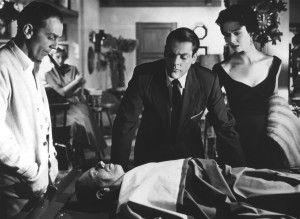 Thursday, July 5th @ 7:30pm
Thursday, July 5th @ 7:30pm
INVASION OF THE BODY SNATCHERS
Directed by Don Siegel • 1956
The residents of fictional Santa Mira, California (also home to Halloween III, for whatever it’s worth) are one by one imperceptibly taken over by pod people, eventually leaving only Kevin McCarthy and his psychiatrist. Originally titled Sleep No More, this was the first of the several adaptations of Jack Finney’s 1954 novel The Body Snatchers, and Don Siegel’s allegory of cultural totalitarianism still remains the most frightening and relevant. Employing virtually no special effects, Siegel’s no-nonsense, low-budget masterpiece seems miles ahead of everything else going on in ’50s sci-fi, and features one of the most claustrophobic uses of widescreen to date (it helps that the SuperScope aspect ratio was forced on it after much of the film was shot for a slightly less wide composition). Look for Sam Peckinpah in a small, small role as a meter reader (he also worked as a dialog coach on this and several other Siegel productions in the 50s), and watch out! You could be next, and you probably are… (JA)
80 min • Allied Artists Pictures • 35mm from Paramount Pictures
Plus: Trailers from 1950s Sci-Fi Thrillers – 35mm – ~ 15 min
Wednesday, July 11th @ 7:30 pm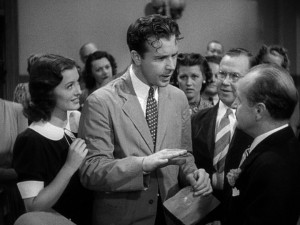
CHRISTMAS IN JULY
Directed by Preston Sturges • 1940
Dick Powell enters a contest to create a new slogan for the Maxford House Coffee Company with hopes of winning $25,000 for himself and his girlfriend Ellen Drew (his entry: “If you can’t sleep at night, it isn’t the coffee, it’s the bunk”). A cruel trick courtesy of Powell’s co-workers convinces the young hopeful that he’s really won the prize, and we learn (or perhaps are reminded of) what it’s like when the difference between success and failure is being able to afford a new couch for your mother’s apartment. Based on the script for an unproduced stage play Sturges wrote in 1931, Christmas in July feels more like Paramount’s pre-Code output than the bulk of Sturges’s own work in the ’40s (which makes sense considering Universal simultaneously picked up and dropped the script in 1934). Running a brief 67 minutes, the film finds a perfect balance between Sturges’s obsessive orchestration of details and his effortless understanding of human interaction, and feels the closest to his heart. (JA)
Co-presented with portoluz–WPA 2.0: A Brand New Deal
67 min • Paramount Pictures • 35mm from Universal
Short: Laurel & Hardy in “Thicker Than Water” (James W. Horne, 1935) – 16mm – 21 min
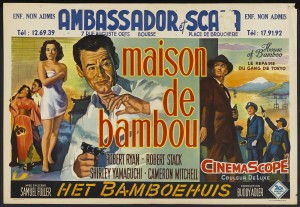 Wednesday, July 18th @ 7:30pm
Wednesday, July 18th @ 7:30pm
HOUSE OF BAMBOO
Directed by Samuel Fuller • 1955
Part Oriental travelogue, part gangster noir, totally Sam Fuller. A respectable idea (the first images of Japan in color and Cinemascope, courtesy 20th Century-Fox) receives totally gonzo treatment from Fuller, whose idea of cultural exchange is an empire of Pachinko graft overseen by sullen ex-GI Robert Ryan and a murder with a Mount Fuji backdrop. Counterespionage stiff Robert Stack infiltrates the Americanized yakuza ring and pursues Shirley Yamaguchi in a surprisingly progressive cross-cultural romance. Working with the biggest budget of his career, Fuller upped the ante of Fox’s docu-crime aesthetic by staging panoramic mayhem on the tourist-friendly streets of Tokyo. A dense pulp delicacy that demands to be seen on the big screen, especially in this brand new print. (KW)
102 min • 20th Century-Fox • 35mm from Criterion Pictures USA
Short: “My Japan” (US Office of War Information, 1945) – 16mm – 20 min
Wednesday, July 25th @ 7:30 pm
LA BELLE EQUIPE
Directed by Julien Duvivier • 1936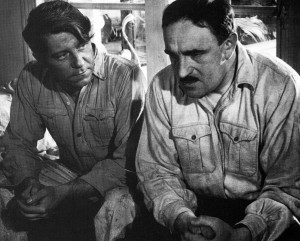
Five factory stiffs, led by Jean Gabin, win the national lottery and find themselves with 100,000 francs between them. They agree to put all the proceeds towards a workers’ open-air dance hall on the banks of the Marne. Made during the very brief moment when such a gesture sounded both guileless and politically-charged, La belle équipe exemplifies the cinema of the Popular Front, France’s short-lived, pan-leftist solution to mounting fascism. (It’s a tribute to the emotional and social complexity of La belle équipe that it records the optimism of the period while also acknowledging its mundane frailty.) Scripted by Charles Spaak, the French film industry’s most committed scenarist, La belle équipe was briefly eyed as a project by Jean Renoir, whose own collaborations with Spaak include Les bas-fonds and La grande illusion. Prolific director Julien Duvivier, a friend of Renoir’s, proved quite capable of helming the picture. Once a classic of college film societies under the generic and uninvolving title They Were Five, this is exceedingly rare and undervalued these days—a real missing link in ’30s French cinema. In French with English subtitles. (KW)
Co-presented with portoluz–WPA 2.0: A Brand New Deal
101 min. • Ciné-Arys • 16mm Print from the French Ministry of Foreign Affairs
Cartoon: Popeye the Sailor in “We Aim to Please” (Dave Fleischer, 1934) – 16mm – 7 min
Wednesday August 1st @ 7:30pm
STAGE STRUCK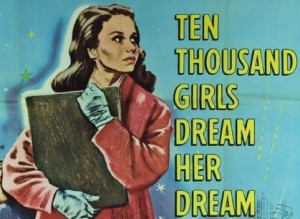
Directed by Sidney Lumet • 1958
Shot entirely on location in New York City, Sidney Lumet’s loose remake of the 1933 Katharine Hepburn vehicle Morning Glory stars a surreally wide eyed Susan Strasberg as a New England hopeful trying to conquer the Broadway stage. Show business dictates that she must choose between a life of stardom and a life of love with stage producer Henry Fonda, which leads to a really beautiful near-final shot of Strasberg, Fonda, and a floor lamp. Slightly dopey but highly affectionate, Strasberg is endearing, Fonda is similarly cute as a button, and Stage Struck is one of the best looking films Lumet ever made, with lush blues and reds and an ultra saturated view of New York. One of the last pictures produced by RKO (the company was bought by Howard Hughes in 1948, sold to the General Tire and Rubber Company in 1955, and dissolved the year of this picture’s release), the film was distributed by Buena Vista, eventually orphaned, and never really got the second look it deserved … here’s its chance. With Christopher Plummer, Herbert Marshall, and a highly explosive Joan Greenwood. (JA)
95 min • RKO • 35mm IB Technicolor from the Radio Cinema Film Archive
Short: “Stage Frights” (Albert Ray, 1935) – 35mm – 22 min
Wednesday, August 8th @ 7:30 pm
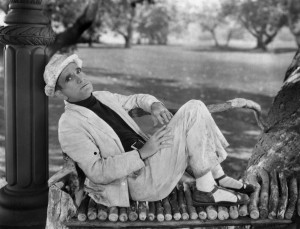 HALLELUJAH I’M A BUM
HALLELUJAH I’M A BUM
Directed by Lewis Milestone • 1933
Also known as Happy Go Lucky, Lazy Bones, and The Heart of New York, this Rodgers and Hart semi-musical takes its original US title from a popular 1908 folk song of sarcastic protest to upper class moralizing of the homeless. Al Jolson (in one of his few non-blackface roles, also his most enjoyable) plays a tramp who falls in love with the girlfriend of an old acquaintance who happens to be the mayor of New York (played by Frank Morgan). Harry Langdon and Edgar Connor are Jolson’s compatriots Egghead and Acorn who remind him that he’ll never leave Central Park. Highly thought of today, most of the original reviews were ambivalent (perhaps the film’s rhyming couplets were too much, too soon…), but the New York Times had the benefit of taking the film at face value: “It is really a sort of tramp’s dream. Sometimes the characters converse in rhyme and on other occasions they sing their opinions. Even Mayor Hastings, presumably of New York, played by Mr. Morgan, is inspired to regale his subordinates with doggerel.” (JA)
Co-presented with portoluz–WPA 2.0: A Brand New Deal
82 min • Feature Productions• 35mm from the Library of Congress
Cartoon: Betty Boop in “The Old Man of the Mountain” (Dave Fleischer, 1933) – 35mm – 7 min
Wednesday, August 15th @ 7:30pm
A HEN IN THE WIND 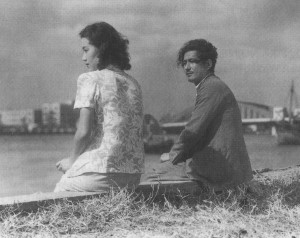
Directed by Yasujiro Ozu • 1948
Post-war strife weighs heavily on impoverished dress-maker Tokiko (Kinuyo Tanaka), who eventually prostitutes herself to pay for her son’s medical care. The much-anticipated demobilization of Tokiko’s husband becomes a dangerous balancing act as she attempts to restore her life while keeping this potentially devastating secret. Long dismissed as an uncharacteristically angry and violent film from Japan’s most serene auteur (not least by the director himself), A Hen in the Wind now looks like a masterful melodrama that challenges viewers with a radical and insistent brand of empathy. It’s true that it’s starker than most Ozu films–the domestic dysfunction doesn’t have to be teased out or assembled from an accumulation of details–but this up-front righteousness is refreshing. That such an urgent social tract emerged from a culture whose entire discourse was so closely regulated by the American occupation is doubly remarkable. In Japanese with English subtitles. (KW)
84 min. • Shôchiku Eiga • 35mm from Janus Films
Cartoon: “The Cat Came Back” (Cordell Barker, 1988) – 35mm – 7 min
Wednesday, August 22nd @ 7:30 pm
THIS DAY AND AGE
Directed by Cecil B. DeMille • 1933
One of the more unaccountable artifacts in 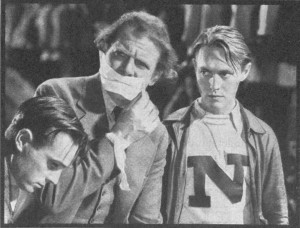 the history of American cinema, DeMille’s filmic op-ed opens with montages of barreling airplanes and never lets up from there. DeMille returns to the high school milieu of The Godless Girl when that institution was still so fresh on the mass culture landscape that any examination of it felt ultra-contemporary and important. Temporarily empowered with law-enforcement authority in a Boys Week gambit, the valedictorians of North High School embark on a vigilante crusade to rid the city of the gangsterism that the adults and their due process niceties can’t quash. Though nominally one of DeMille’s modern stories, the boys’ solutions have a decidedly Old Testament flavor, not least extracting information from one hood by dangling him over a pit of live rats. Simultaneously awestruck by fascist methodology and solidly anti-bigotry (the boys’ crusade is set in motion by the murder of a Jewish tailor), This Day and Age is civic-minded in a one-of-a-kind way. As a social document of the anxieties and options in the air at the dawn of the New Deal era, This Day and Age remains unmatched. It also includes a line about olives that ranks with the filthiest moments of pre-Code Hollywood. (KW)
the history of American cinema, DeMille’s filmic op-ed opens with montages of barreling airplanes and never lets up from there. DeMille returns to the high school milieu of The Godless Girl when that institution was still so fresh on the mass culture landscape that any examination of it felt ultra-contemporary and important. Temporarily empowered with law-enforcement authority in a Boys Week gambit, the valedictorians of North High School embark on a vigilante crusade to rid the city of the gangsterism that the adults and their due process niceties can’t quash. Though nominally one of DeMille’s modern stories, the boys’ solutions have a decidedly Old Testament flavor, not least extracting information from one hood by dangling him over a pit of live rats. Simultaneously awestruck by fascist methodology and solidly anti-bigotry (the boys’ crusade is set in motion by the murder of a Jewish tailor), This Day and Age is civic-minded in a one-of-a-kind way. As a social document of the anxieties and options in the air at the dawn of the New Deal era, This Day and Age remains unmatched. It also includes a line about olives that ranks with the filthiest moments of pre-Code Hollywood. (KW)
Co-presented with portoluz–WPA 2.0: A Brand New Deal
86 min. • Paramount Pictures • 35mm from Universal
Cartoon: Popeye the Sailor in “The Man on the Flying Trapeze” (Dave Fleischer, 1934) – 16mm – 7 min
Short: “Hollywood Extra Girl” (Herbert Moulton, 1935) – 16mm – 11 min
Wednesday, August 29th @ 7:30pm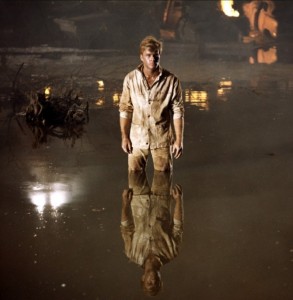
THE CHASE
Directed by Arthur Penn • 1966
A bold and somewhat irresponsible diagnosis of a good half-dozen uniquely American illnesses, The Chase is an epic serving of Southern Gothic updated for an age of civil rights and Cinemascope. It’s Saturday night in Tarl, Texas and the usual barbecues and wife swaps take a back seat to the collective anxieties unleashed by the prison break of “Bubbers” Reeves (Robert Redford), the local bad boy who may harbor a sound grudge against a prominent town father. Only Marlon Brando’s professional martyr Sheriff Calder stands between the townsfolk and a junkyard cataclysm. As a follow-up to producer Sam Spiegel’s Lawrence of Arabia, The Chase manages a crazy but equally prestigious pedigree: Lillian Hellman adapts Horton Foote’s play, hot shot director Arthur Penn works with his largest and messiest canvas yet, and the unstable all-star constellation mixes rising talent (Jane Fonda, Robert Duvall, Angie Dickinson) and declining veterans (Miriam Hopkins, Bruce Cabot, Grady Sutton). Uncomfortably in tune with a violent and complex contemporary landscape, The Chase was a much-mocked flop (Judith Crist called it “a mishmash of Peyton Place sociology, Western mythology, and Deep South psychology”) gone from theaters by the time that Summer 1966 brought fresh news of riots in Chicago and Cleveland. (KW)
135 min. • Columbia Pictures • 35mm Vault Print from Sony Pictures Repertory
Cartoon: Wile E. Coyote & Road Runner in “Fast and Furry-ous” (Chuck Jones, 1949) – 35mm Technicolor – 7 min
